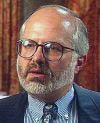The Scopes ‘Monkey Trial’Until the 1990s no trial in American history had attracted more attention—and been more misunderstood—than the 1925 trial in Dayton, Tennessee, of John Thomas Scopes, accused of violating a state law banning the teaching of human evolution. Shortly after the governor of Tennessee signed the antievolution bill into law, the fledgling American Civil Liberties Union (ACLU) in New York City began to search for a volunteer to test the constitutionality of the law. Although young Scopes had not taught biology and could not remember for sure whether he had discussed evolution during a brief period substituting for the regular biology teacher, he agreed to be "arrested" and to stand trial. For the contest the ACLU brought in several big-city attorneys, including the famed criminal lawyer and agnostic Clarence Darrow from Chicago. To assist the prosecution, the World’s Christian Fundamentals Association secured the services of William Jennings Bryan of Nebraska, a thrice-defeated Democratic candidate for the presidency of the United States and a well-known Presbyterian antievolutionist. The July trial, which lasted eight days through searing heat, attracted international news coverage. The Chicago radio station WGN made history by broadcasting the trial. Downtown Dayton took on the appearance of a carnival. The highpoint of the trial came on the seventh day, when Darrow put Bryan on the stand as a biblical expert, obviously expecting him to defend a literal reading of the Bible. To Darrow’s apparent surprise, Bryan, who, like virtually all Fundamentalist spokesmen, accepted the great antiquity of life on earth, happily volunteered that the "days" of creation could have spanned as many as 600,000,000 years each. Bryan explained that although he believed "everything in the Bible should be accepted as it is given there; some of the Bible is given illustratively. For instance, ‘Ye are the salt of the earth.’ I would not insist that man was actually salt, or that he had flesh of salt, but it is used in the sense of salt as saving God’s people." (Privately, Bryan expressed a willingness to accept pre-human evolution—if scientists could demonstrate the evolution of one species into another.) The trial, as expected, ended in a conviction for Scopes, whose own attorneys conceded his guilt. Five days later Bryan died in his sleep, a martyr to antievolutionist cause. Over the years a number of historians have claimed that, despite Scopes’s legal conviction, the trial actually represented a public-relations victory for the evolutionists. The award-winning movie Inherit the Wind conveys the same message. As the story goes, Bryan’s testimony at Dayton, in which he admitted the antiquity of life on earth, destroyed his credibility with fellow Fundamentalists and brought about the demise of the antievolution movement. The available evidence, however, supports none of these claims. Many journalists did indeed review Bryan’s performance at Dayton harshly, writing that he revealed his ignorance of both religion and science. But Darrow also receive considerable criticism in the press: for disrespecting the judge, for treating Bryan rudely, and for trying to deny the people of Tennessee their democratic right to determine what should be taught in their tax-supported schools. In fact, Darrow became such a liability, the ACLU tried (unsuccessfully) to dump him from the defense team handling Scopes’s appeal to the state supreme court. By and large, the Fundamentalists emerged from the trial flushed with a sense of victory and proud of the way Bryan had handled himself. The head of the World’s Christian Fundamentals Association, which had invited Bryan to Dayton, praised him for his "signal conquest" on behalf of Fundamentalism: "He not only won his case in the judgment of the Judge, in the judgment of the Jurors, in the judgment of the Tennessee populace attending; he won it in the judgment of an intelligent world." Fundamentalists leaders could hardly have felt betrayed by
Bryan’s advocacy of an ancient earth, because, except for
the Seventh-day Adventist George McCready Price, they agreed with
him on that life on earth long antedated Adam and Eve. The events
at Dayton neither ended the antievolution crusade nor slowed it
down; nearly two-thirds of the antievolution bills introduced
in state legislatures in the 1920s came after 1925. Despite
its immense symbolic significance, the Scopes trial exerted little
influence on the actual course of antievolutionism in America.
Email link | Printer-friendly | Feedback | Contributed by: Dr. Ron Numbers |






